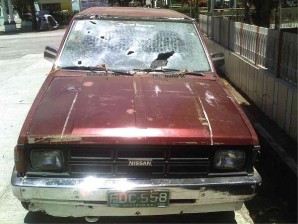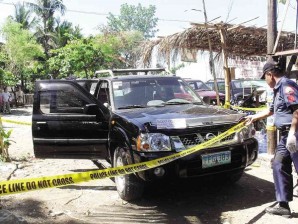2010 poll killings in Antique town remain unsolved

THE NISSAN Pathfinder, one of the vehicles boarded by supporters of mayoral candidate Gil Bandoja, is riddled with bullets allegedly fired by policemen manning a checkpoint along the national highway of Tibiao town, Antique, on May 9, 2010. Nestor P. Burgos Jr.
On the eve of the May 10 elections in 2010, four supporters of a candidate for mayor were killed while five others were wounded when policemen opened fire at their vehicles in Tibiao town, Antique.
Three years have passed and new elections have just been held, but the killings are still unsolved.
“This is grave injustice,” said Samuel Galuego, legal counsel of engineer Gil Bandoja.
The victims were supporters of Bandoja who was running for mayor of Tibiao in 2010.
His supporters were in a convoy of vehicles on May 9, 2010, when four policemen opened fire at them along the national highway in Tibiao, 75 kilometers north of the capital town of San Jose.
Article continues after this advertisementKilled were Efraim Pagharion, Rogelio Pagsuguiron, Edgar Magtulis and Andresito Bandoja Jr.
Article continues after this advertisementThe killings are considered the worst election-related violence in Antique since the Feb. 11, 1986, murder of former Gov. Evelio Javier.
Three policemen involved in the shooting had alleged that they set up a checkpoint to intercept the two vehicles based on a report that the men that the cars were carrying had been acting “suspiciously.”
The policemen claimed that Bandoja’s supporters ignored the checkpoint and fired, prompting a gunfight.
They also alleged that they recovered four .45 cal. pistols and a grenade from one of the vehicles.
But on June 17, 2010, the National Bureau of Investigation filed multiple murder, frustrated murder and attempted murder complaints in the Antique provincial prosecutor’s office against Chief Insp. Frankie Jingle Lugo, former police chief of Tibiao; Insp. Allan Relo, former deputy police chief; and PO2 Melvin Gindap.

A POLICE investigator inspects the Nissan Frontier that carried supporters of mayoral candidate Gil Bandoja when policemen repeatedly fired at the vehicle along the national highway of Tibiao town, Antique, on May 9, 2010. Photo Courtesy of Antique police
The NBI, which conducted a separate investigation, concluded that there was no encounter but a “planned ambush” that almost led to a “massacre.”
The NBI cited testimonies given by survivors and witnesses residing near the crime scene that there was no signboard indicating a checkpoint authorized by the Commission on Elections.
The killings crippled Bandoja’s campaign and terrorized his supporters. He finished second in the mayoral race to Walden Lim.
Galuego lamented the slow progress of the case.
The Antique provincial prosecutor’s office issued a resolution on June 22, 2011, finding probable cause to charge the policemen with four counts of homicide and multiple counts of frustrated murder and attempted murder.
But the filing of formal charges was delayed after the case was forwarded to the Office of the Deputy Ombudsman for the Military and Other Law Enforcement Offices on Sept. 27, 2011, because the respondents were policemen.
More than a year later, on Nov. 21, 2012, the Ombudsman issued an order remanding the case to the provincial prosecutor’s office based on an agreement between the Department of Justice and the Ombudsman giving the two agencies jurisdiction on complaints involving public officers and employees not covered by the Sandiganbayan.
The order was, however, approved for release only on Feb. 11, 2013, by Overall Deputy Ombudsman Orlando Casimiro.
The case is now pending at the Antique Regional Trial Court Branch 64.
A separate administrative case filed in the regional office of the National Police Commission on Sept. 14, 2010, is for resolution.
Galuego said that although the charges had been filed, the case was expected to suffer delays because the court where it was sent to had no regular presiding judge.
The delay in the case has also taken its toll on the accused policemen, according to their lawyer Arturo Pacificador.
“My clients have been deprived of their right to speedy trial,” Pacificador said.
He said the policemen had been left on “floating status” because of the pending cases against them.
Running with the United Nationalist Alliance, Bandoja defeated reelectionist Mayor Walden Lim of Aksyon Demokratiko and Pelver Medina of the Liberal Party in the May 13 elections.
But despite Bandoja’s victory, the questions that have hounded Tibiao residents remain.
Was it an encounter, as the police claimed, or did the police disregard the rules of engagement by shooting at unarmed civilians? If the shooting was intentional, were the policemen acting alone or were they backed by powerful individuals or groups?